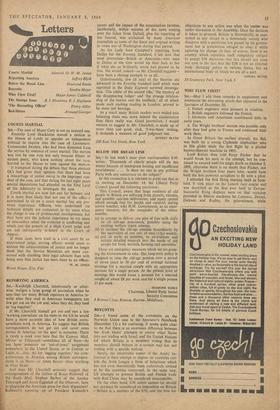ih ni , Letters
Courts Martial Admiral Sir W. M. James Reporting America Jeffrey Blyth Below the Bread Line Desmond Banks Boycotts Sandra Meyer Who Flew First? Major James Caldwell The Stamps Issue B. J. Meadows, R. J. Hayhurst `The Recruiting Officer' Henry Adler Bed-Sitters Armand Georges COURTS MARTIAL
SIR,—The case of Major Cory is not an isolated one.
Recently Lord Shackleton moved a motion in the House of Lords to appoint an independent tribunal to inquire into the case of Lieutenant- Commander Swabey, who had been dismissed from the service by sentence of court martial. The motion was lost by one vote but only because fifteen or sixteen peers, who knew nothing about the case, hurried to the House to vote against the motion.
It transpired during the debate that three eminent QCs had given their opinion that there had been a miscarriage of justice owing to the improper con- duct of the case, and that during the last eight years several deputations had attended on the First Lord of the Admiralty to investigate the case.
Courts martial are now few and far between and it is more than likely that not one of the office s summoned to sit on a court martial has any pre- vious experience. Officers, who understand the technical details, are competent to try cases when the charge is one of professional incompetence, but they have not the judicial experience to try cases of misconduct when the evidence is conflicting and which test the powers of a High Court judge and are not infrequently re-heard in the Court of Appeal.
If these cases were tried in a civil court by an experienced judge, serving officers would cease to distrust the administration of justice and no longer think that the Service Ministries are more con- cerned with shielding their legal advisers than with being sure that justice has been done to an officer. W. M. JAMES Wynd House, Elie, Fife






























 Previous page
Previous page